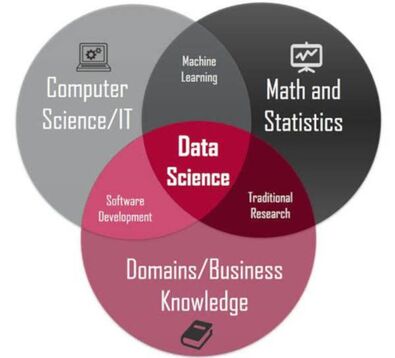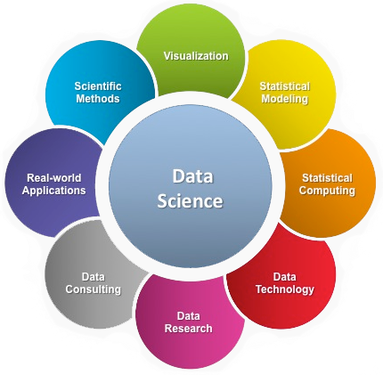AI 301: Data science
人工智慧與大數據系列:數據科學

What is A.I., Machine Learning and Data Science:
Data Science is a field of study that collects, streamlines, prepares, and organizes both human and machine generated data. It aims to extract and understand the meaning of collected raw data. Companies of different sizes are constantly generate large amounts of data at any given second around the world, it is becoming an increasingly challenging task to keep track of all of this data. Data scientists analyze the data and create useful information for business operations, medical research, and mechanical automation. Data science is also the critical initial steps of Machine Learning (ML) to enable computers to function intelligently in a challenging, unguided environment. Machine Learning is a subsection of A.I. where large amount of data is used to produce sophisticate models a computer can adopt to solve various problems without explicit instruction from operators.
How are A.I., Machine Learning & Data Science used nowadays:
The adoption of modern technologies generate an increasing large number of data, from social networks, e-commerce activities, manufacturing facilities, and almost every enterprises and government. A.I. and Machine Learning are used not only to understand the behavior of these complex systems, but also to predict future critical events. The ability to predict future events mimic human intelligence. A.I. obtains this intelligence through the method of Machine Learning, similar to the way human being learns.
A.I. through Machine Learning enjoys explosive growth recently due to the advancement of computing power, cloud technology, and the large amount of data available. It has been recognized our society will advance into the next wave of technology driven by information extracted from data, and adoption of A.I. in every aspect of human activities.
A.I. 301 - Data Science : The instructional plan
This is an intermediate class designed to engage students to solve Data Science challenges by working on the following topics:
1. Math for Machine Learning ~ Linear Algebra and Statistic: Class materials are designed to be absorbed by high school and advanced middle school students. Our students are not expected to have prior experience in similar coursework. We will cover all the basics, enough for working with programming tools to solve A.I. challenges.
2. Python for Machine Learning ~ Numpy, Scipy and visualization package: Once acquired basic understanding of Linear Algebra and Static concept and terminology, students will be able to learn Numpy and Scipy for numerical processing of large dataset, and visualize the information extracted from data using various plotting packages.
3. Machine Learning Model, Supervised and Unsupervised Learning, Re-enforcement Learning and Classification.
4. Popular Python Machine Learning frameworks.
5. Execution of simple machine learning projects in image processing and natural language understanding.
Prerequisites: A.I. 201 (or equivalent background)
人工智慧與大數據系列:數據科學
教學目標:實力鞏固 / For skills advancement
學習難度:3 ~ 5 (5 最難,1 最易) / For intermediate learners with prior experience in Python coding
適合年級:八年級以上(含) / For ascending 8th+ graders
總共課時:24 hrs. class length
附註說明:學生需具備Python 編程基礎 / For learners with fundamental Python coding skills.
需自備手提電腦來上課 / Must bring own laptop computer to the class
Data Science is a field of study that collects, streamlines, prepares, and organizes both human and machine generated data. It aims to extract and understand the meaning of collected raw data. Companies of different sizes are constantly generate large amounts of data at any given second around the world, it is becoming an increasingly challenging task to keep track of all of this data. Data scientists analyze the data and create useful information for business operations, medical research, and mechanical automation. Data science is also the critical initial steps of Machine Learning (ML) to enable computers to function intelligently in a challenging, unguided environment. Machine Learning is a subsection of A.I. where large amount of data is used to produce sophisticate models a computer can adopt to solve various problems without explicit instruction from operators.
How are A.I., Machine Learning & Data Science used nowadays:
The adoption of modern technologies generate an increasing large number of data, from social networks, e-commerce activities, manufacturing facilities, and almost every enterprises and government. A.I. and Machine Learning are used not only to understand the behavior of these complex systems, but also to predict future critical events. The ability to predict future events mimic human intelligence. A.I. obtains this intelligence through the method of Machine Learning, similar to the way human being learns.
A.I. through Machine Learning enjoys explosive growth recently due to the advancement of computing power, cloud technology, and the large amount of data available. It has been recognized our society will advance into the next wave of technology driven by information extracted from data, and adoption of A.I. in every aspect of human activities.
A.I. 301 - Data Science : The instructional plan
This is an intermediate class designed to engage students to solve Data Science challenges by working on the following topics:
1. Math for Machine Learning ~ Linear Algebra and Statistic: Class materials are designed to be absorbed by high school and advanced middle school students. Our students are not expected to have prior experience in similar coursework. We will cover all the basics, enough for working with programming tools to solve A.I. challenges.
2. Python for Machine Learning ~ Numpy, Scipy and visualization package: Once acquired basic understanding of Linear Algebra and Static concept and terminology, students will be able to learn Numpy and Scipy for numerical processing of large dataset, and visualize the information extracted from data using various plotting packages.
3. Machine Learning Model, Supervised and Unsupervised Learning, Re-enforcement Learning and Classification.
4. Popular Python Machine Learning frameworks.
5. Execution of simple machine learning projects in image processing and natural language understanding.
Prerequisites: A.I. 201 (or equivalent background)
人工智慧與大數據系列:數據科學
教學目標:實力鞏固 / For skills advancement
學習難度:3 ~ 5 (5 最難,1 最易) / For intermediate learners with prior experience in Python coding
適合年級:八年級以上(含) / For ascending 8th+ graders
總共課時:24 hrs. class length
附註說明:學生需具備Python 編程基礎 / For learners with fundamental Python coding skills.
需自備手提電腦來上課 / Must bring own laptop computer to the class


